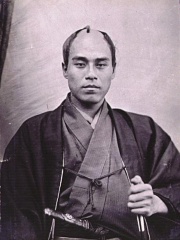
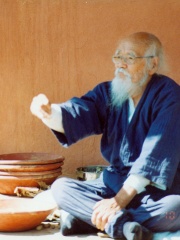
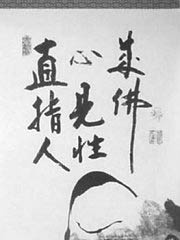
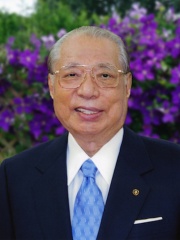
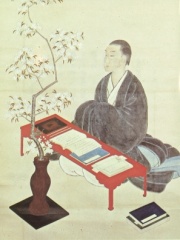
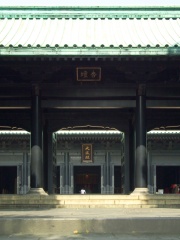
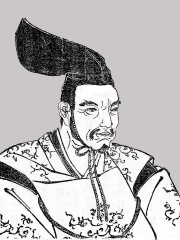
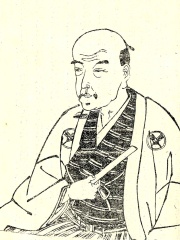
The Most Famous
PHILOSOPHERS from Japan
This page contains a list of the greatest Japanese Philosophers. The pantheon dataset contains 1,267 Philosophers, 10 of which were born in Japan. This makes Japan the birth place of the 22nd most number of Philosophers behind Iraq, and Hungary.
Top 10
The following people are considered by Pantheon to be the top 10 most legendary Japanese Philosophers of all time. This list of famous Japanese Philosophers is sorted by HPI (Historical Popularity Index), a metric that aggregates information on a biography's online popularity. Visit the rankings page to view the entire list of Japanese Philosophers.

1. Fukuzawa Yukichi (1835 - 1901)
With an HPI of 69.20, Fukuzawa Yukichi is the most famous Japanese Philosopher. His biography has been translated into 38 different languages on wikipedia.
Fukuzawa Yukichi (Japanese: 福澤 諭吉; 10 January 1835 – 3 February 1901) was a Japanese author, educator, and philosopher. He is known for his efforts to introduce and promote Western ideas and institutions in Meiji Japan. Born into a low-ranking samurai family, Fukuzawa became critical of the feudal class system of Tokugawa Japan. He studied Dutch (Rangaku) and later taught himself English, eventually becoming an official translator for the shogunate. He traveled abroad with the first Japanese mission to the United States in 1860 and the first mission to Europe in 1862. After the Meiji Restoration of 1868, Fukuzawa became a leading promoter of the Bunmei-kaika (Civilization and Enlightenment) movement. He declined all government positions, choosing to remain an independent educator and writer. His writings, including the bestsellers Seiyō Jijō (Conditions in the West) and Gakumon no Susume (An Encouragement of Learning), explained Western civilization and advocated for social change. In Gakumon no Susume, he famously wrote, "Heaven never created a man above another nor a man below another," arguing that social status was determined by education and practical knowledge (jitsugaku). He founded Keio Gijuku and the newspaper Jiji Shinpō. Fukuzawa's views on foreign policy evolved from idealism to a pragmatic acceptance of Social Darwinism, arguing that military strength was essential for national survival. In his influential 1885 editorial "Datsu-A Ron" ("Leaving Asia"), he advocated for Japan to align itself with the "civilized" nations of the West and distance itself from its "hopelessly backward" Asian neighbors. He became a strong supporter of the First Sino-Japanese War. His portrait appeared on the 10,000 yen note from 1984 to 2024.

2. Masanobu Fukuoka (1913 - 2008)
With an HPI of 67.78, Masanobu Fukuoka is the 2nd most famous Japanese Philosopher. His biography has been translated into 39 different languages.
Masanobu Fukuoka (Japanese: 福岡 正信, Hepburn: Fukuoka Masanobu; 2 February 1913 – 16 August 2008) was a Japanese farmer and philosopher celebrated for his natural farming and re-vegetation of desertified lands. He was a proponent of no-till, herbicide and pesticide-free cultivation methods from which he created a particular method of agriculture, commonly referred to as "natural farming" or "do-nothing farming". Fukuoka was the author of several books, scientific papers and other publications, and was featured in television documentaries and interviews from the 1970s onwards. His influences went beyond farming to inspire individuals within the natural food and lifestyle movements. He was an outspoken advocate of the value of observing nature's principles.

3. Hakuin Ekaku (1686 - 1769)
With an HPI of 63.26, Hakuin Ekaku is the 3rd most famous Japanese Philosopher. His biography has been translated into 21 different languages.
Hakuin Ekaku (白隠 慧鶴; January 19, 1686 – January 18, 1769) was one of the most influential figures in Japanese Zen Buddhism, who regarded bodhicitta, working for the benefit of others, as the ultimate concern of Zen-training. While never having received formal dharma transmission, he is regarded as the reviver of the Japanese Rinzai school from a period of stagnation, focusing on rigorous training methods integrating meditation and koan practice.

4. Daisaku Ikeda (1928 - 2023)
With an HPI of 62.34, Daisaku Ikeda is the 4th most famous Japanese Philosopher. His biography has been translated into 25 different languages.
Daisaku Ikeda (池田 大作, Ikeda Daisaku; 2 January 1928 – 15 November 2023) was a philospher, peace-builder, SGI Buddhist leader, author, poet, educator and nuclear disarmament advocate. He served as the third president and then honorary president of the Soka Gakkai, which is considered among the largest of Japan's new religious movements. The Soka Gakkai Japanese membership exceeds 8.27 million households. Between 2.5 million and 4 million people - approximately two to three percent of the Japanese population - are active members of Soka Gakkai. Ikeda was the founding president of the Soka Gakkai International, which garnered worldwide membership.The organization has approximately 12 million practitioners in 192 countries and territories.more than 1.5 million of whom reside outside of Japan as of 2012. Ikeda was the founder of a variety of educational and cultural institutions including Soka University, Soka University of America, Min-On Concert Association and Tokyo Fuji Art Museum. In Japan, he was also known for his international outreach to China.
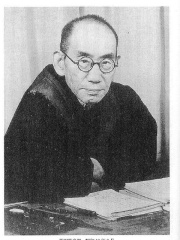
5. Kitaro Nishida (1870 - 1945)
With an HPI of 62.32, Kitaro Nishida is the 5th most famous Japanese Philosopher. His biography has been translated into 27 different languages.
Kitarō Nishida (西田 幾多郎, Nishida Kitarō; May 19, 1870 – June 7, 1945) was a Japanese moral philosopher, philosopher of mathematics and science, and religious scholar. He was the founder of what has been called the Kyoto School of philosophy. He graduated from the University of Tokyo during the Meiji period in 1894 with a degree in philosophy. He was named professor of the Fourth Higher School in Ishikawa Prefecture in 1899 and later became professor of philosophy at Kyoto University. Nishida retired in 1927. In 1940, he was awarded the Order of Culture (文化勲章, bunka kunshō). He participated in establishing the Chiba Institute of Technology (千葉工業大学) from 1940. Nishida Kitarō died at the age of 75 of a renal infection. His cremated remains were divided in three and buried at different locations. Part of his remains were buried in the Nishida family grave in his birthplace Unoke, Ishikawa. A second grave can be found at Tōkei-ji Temple in Kamakura, where his friend D. T. Suzuki organized Nishida's funeral and was later also buried in the adjacent plot. Nishida's third grave is at Reiun'in (霊雲院, Reiun'in), a temple in the Myōshin-ji compound in Kyoto.

6. Motoori Norinaga (1730 - 1801)
With an HPI of 62.03, Motoori Norinaga is the 6th most famous Japanese Philosopher. His biography has been translated into 24 different languages.
Motoori Norinaga (本居 宣長; 21 June 1730 – 5 November 1801) was a Japanese scholar of Kokugaku active during the Edo period. He is conventionally ranked as one of the Four Great Men of Kokugaku (nativist) studies.

7. Hayashi Razan (1583 - 1657)
With an HPI of 61.86, Hayashi Razan is the 7th most famous Japanese Philosopher. His biography has been translated into 21 different languages.
Hayashi Razan (林 羅山; 1583 – March 7, 1657), also known as Hayashi Dōshun, was a Japanese historian, philosopher, political consultant, and writer, serving as a tutor and an advisor to the first four shōguns of the Tokugawa bakufu. He is also attributed with first listing the Three Views of Japan. Razan was the founder of the Hayashi clan of Confucian scholars. Razan was an influential scholar, teacher and administrator. Together with his sons and grandsons, he is credited with establishing the official neo-Confucian doctrine of the Tokugawa shogunate. Razan's emphasis on the values inherent in a static conservative perspective provided the intellectual underpinnings for the Edo bakufu. Razan also reinterpreted Shinto, and thus created a foundation for the eventual development of Confucianised Shinto in the 20th century. The intellectual foundation of Razan's life's work was based on early studies with Fujiwara Seika (1561–1619), the first Japanese scholar who is known for a close study of Confucius and the Confucian commentators. This kuge noble had become a Buddhist priest; but Fujiwara's dissatisfaction with the philosophy and doctrines of Buddhism led him to a study of Confucianism. In due course, Fujiwara drew other similarly motivated scholars to join him in studies which were greatly influenced by the work of Chinese Neo-Confucianist Zhu Xi, a philosopher of the Song dynasty. Zhu Xi and Fujiwara emphasized the role of the individual as a functionary of a society which naturally settles into a certain hierarchical form. He separated people into four distinct classes: samurai (ruling class), farmers, artisans and merchants.

8. Arai Hakuseki (1657 - 1725)
With an HPI of 60.45, Arai Hakuseki is the 8th most famous Japanese Philosopher. His biography has been translated into 23 different languages.
Arai Hakuseki (新井 白石; March 24, 1657 – June 29, 1725) was a Confucianist, scholar-bureaucrat, academic, administrator, writer and politician in Japan during the middle of the Edo period, who advised the shōgun Tokugawa Ienobu. His personal name was Kinmi or Kimiyoshi (君美). Hakuseki (白石) was his pen name. His father was a Kururi han samurai Arai Masazumi (新井 正済).

9. Ogyū Sorai (1666 - 1728)
With an HPI of 59.64, Ogyū Sorai is the 9th most famous Japanese Philosopher. His biography has been translated into 18 different languages.
Ogyū Sorai (荻生 徂徠; Japanese pronunciation: [o.ɡʲɯː (|) soꜜ.ɾai, o.ŋʲɯː-], March 21, 1666 – February 28, 1728), pen name Butsusorai/Bussorai (物徂徠), was a Japanese historian, philologist, philosopher, and translator. He has been described as the most influential such scholar during the Edo period Japan. His primary area of study was in applying the teachings of Confucianism to government and social order. He responded to contemporary economic and political failings of the Tokugawa shogunate, as well as the culture of mercantilism and the dominance of old institutions that had become weak with extravagance. Sorai rejected the moralism of Neo-Confucianism and instead looked to the ancient works. He argued that allowing emotions to be expressed was important and nurtured Chinese literature in Japan for this reason. Sorai attracted a large following with his teachings and created the Sorai school, which would become an influential force in further Confucian scholarship in Japan.
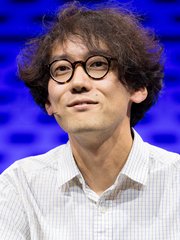
10. Kohei Saito (b. 1987)
With an HPI of 43.47, Kohei Saito is the 10th most famous Japanese Philosopher. His biography has been translated into 14 different languages.
Kohei Saito (斎藤 幸平, Saitō Kōhei) (born January 31, 1987) is a Japanese philosopher. He is an associate professor at the University of Tokyo. Saito works on ecology and political economy from a Marxist perspective. His 2020 book Capital in the Anthropocene has been credited for inspiring a resurgence of interest in Marxist thought in Japan.
People
Pantheon has 10 people classified as Japanese philosophers born between 1583 and 1987. Of these 10, 1 (10.00%) of them are still alive today. The most famous living Japanese philosophers include Kohei Saito. The most famous deceased Japanese philosophers include Fukuzawa Yukichi, Masanobu Fukuoka, and Hakuin Ekaku. As of April 2024, 1 new Japanese philosophers have been added to Pantheon including Kohei Saito.
Living Japanese Philosophers
Go to all RankingsDeceased Japanese Philosophers
Go to all RankingsFukuzawa Yukichi
1835 - 1901
HPI: 69.20
Masanobu Fukuoka
1913 - 2008
HPI: 67.78
Hakuin Ekaku
1686 - 1769
HPI: 63.26
Daisaku Ikeda
1928 - 2023
HPI: 62.34
Kitaro Nishida
1870 - 1945
HPI: 62.32
Motoori Norinaga
1730 - 1801
HPI: 62.03
Hayashi Razan
1583 - 1657
HPI: 61.86
Arai Hakuseki
1657 - 1725
HPI: 60.45
Ogyū Sorai
1666 - 1728
HPI: 59.64
Newly Added Japanese Philosophers (2025)
Go to all RankingsOverlapping Lives
Which Philosophers were alive at the same time? This visualization shows the lifespans of the 5 most globally memorable Philosophers since 1700.

